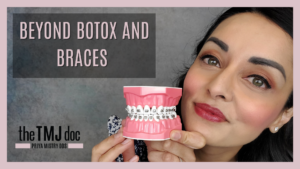In today’s daily health segment, we uncovered some jaw-dropping revelations about how every day habits can impact our jaw health. Dr. Priya Mistry, a TMJ Dentist treating pain in the jaw joint and muscles, joined us to shed light on this often-overlooked aspect of our health. Here’s a summary of her valuable insights and advice.
Why Jaw Health Matters
Dr. Mistry emphasized the importance of jaw health for several reasons:
- High Usage: The jaw joints are the most used joints in the body, and they are involved even during sleep due to constant swallowing.
- Posture Connection: The jaw is a crucial component of our posture, interconnected with the feet, hips, spine, and shoulders. Imbalances in the jaw can affect the entire body and vice versa.
Five Common Habits to Avoid
Dr. Mistry highlighted five common habits that can harm our jaw health:
- Resting Your Hand Against Your Jaw: This can lead to too much sideways pressure on the jaw joints, causing pain and dysfunction.
- Chewing Gum or Pens: Repetitive chewing motions can strain the jaw joints.
- Biting Your Nails: Biting your nails is not only unhygienic but also stressful for the jaw due to repetitive motion.
- Opening Things with Your Teeth: A common but harmful habit that can damage the jaw.
- Forward or Tilted Head Posture: This habit can put excess pressure on the neck, which can feed up and affect the jaw negatively.
Simple Jaw Massages
Dr. Mistry shared easy massages to add to our daily routine to help maintain jaw health:
- Temporalis Muscle Massage:
- Use your pointer and middle fingers to find the depression right behind your eye bone and above your cheekbone.
- Press inwards and rub clockwise, then counterclockwise.
- Move an inch up and back, repeating the process to release the middle fibers of the muscle.
- Masseter Muscle Release:
- Use your middle knuckles to press under your cheekbones.
- Gently bite your teeth together without clenching.
- Rub with force downwards to release knots in the muscles.
Common Jaw Issues
Many people mistakenly believe that jaw issues are only related to clicking, popping, or locking of the jaw. Dr. Mistry clarified that silent joints can also cause significant problems such as:
- Headaches and migraines
- Jaw, neck, and shoulder pain
- Ear pain, stuffy ears, dizziness, and hearing loss
- Tooth and gum pain
Getting Help
If you suspect jaw issues, Dr. Mistry advises trying her jaw massages. These are available on her Socials:
For severe problems, seek help from a local TMJ dentist or physical therapist.
By addressing these common habits and following Dr. Mistry’s advice, you can improve your jaw health and overall well-being. Don’t overlook the importance of maintaining a healthy jaw – it plays a crucial role in your daily life!







